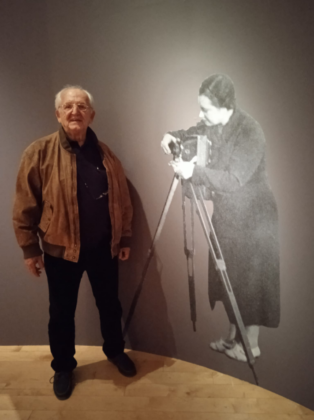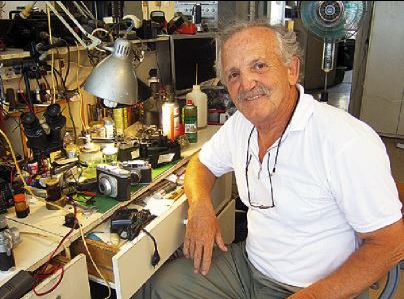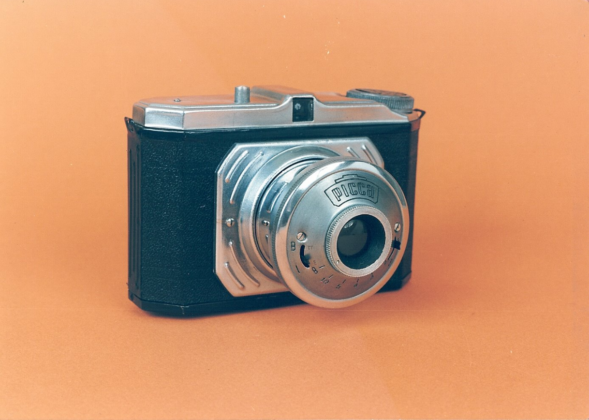Through the lens of time – a tale of three generations of photographers
by Kelly Fanarioti
The small lab of the Picopoulos family on Lekka Street, in the center of Athens, exudes the air of a time capsule: a delicate blend of past and present, a journey through time framed by the click of a shutter.
Entering the lab, one is welcomed by an amazing display of analog cameras, some of which have a century-old history, while at the window sits a Pica, the first Greek-made amateur camera, which was developed after the Second World War by the camera pioneer, Dimitris Picopoulos.

Nikolaos Picopoulos at a Benaki Museum Exhibition
The camera-repair family business was started by Dimitris Picopoulos in 1953, and then with the passage of years it was passed on to his son Nikos, and later to his grandson, Philipos, who is the present owner of the business.
The 77-year-old Nikos Picopoulos has a treasury of stories to tell, from his childhood helping his father from the age of six.
“As a child, I always loved helping in any way I could. I was eager: making myself useful. I have a strong connection with Pica. I know intimately every bit of the camera, from the moment she was born, and I really felt I was part of it, having contributed to its creation. I remember the many customers coming to the lab– those were beautiful years. Then later, at the age of 28, I moved the lab to on Voukourestiou Street, but the business didn’t go very well, and in 1981, we were re-installed on Lekka Street, where we are today.”
Despite his age, he continues to work every day. In fact, he has transformed space at his home into a lab, to be able to also work from there.
“For 71 years, crafting cameras has been the central passion of my daily existence. It is a huge part of my life – it’s impossible for me not to continue working. For as long as I will be healthy, I will not stop. Besides, the longer one continues to work and exercise their mind, the healthier, mentally and physically, they will be”.
The rapid advances in photo technology did deal a severe economic blow to the Picopoulos lab, resulting in a sizable loss of customers.

Nikolaos Picopoulos at his workshop
“I remember being very afraid back then. It was something entirely new—the world had plunged headfirst into digital cameras, digital cinematography, and videography. Videography no longer required film; everything was done with mobile phones. Cinematography completely disappeared, and that was a blow for us because it constituted 30% of our work. During that period, my children were studying, and I advised them to choose a different profession, because mine had essentially died. However, as the years went by, there was a shift back towards all things old. Just like what happened with vinyl records, which more and more people now prefer, the same trend occurred with film cameras. Our clientele returned, primarily consisting of collectors and analog camera enthusiasts,” says Mr. Picopoulos.
Both the family believes that this turn towards anything old stems from people’s need to maintain a connection with their past.
Mr. Picopoulos says: “Customers come in for repairs on their analog cameras, and even though we explain that it’s costly and not cost-effective for them, they insist on having it fixed because it holds emotional value for them.’
‘In the past, we used to visit the homes of relatives and friends, and in the living room, there were albums filled with photographs from weddings, baptisms, and trips. Nowadays, everything is stored on mobile phones, and often these files are lost when the device gets wet or malfunctions for any reason. Additionally, very few people today bother to print photos taken with their phones. The entire process, back when film was in use, felt like a sacred ritual. I particularly enjoy it when young people come to the workshop and ask to learn how to use the analog camera that their father or grandfather gifted them. I guide them through the entire process with immense joy, in the dimly lit room with the film rolls.”

Pica, the first ever Greek built camera
He maintains that despite the race of new technology, people will continue to cherish and seek out old objects, whether they are photographic cameras, vinyl records, or any other accessories.
“Consider today’s retirees. Fortunately, many of them persist in going to the bank to collect their pensions. It’s not enough for them to have the money directly deposited into their accounts. They know that by going to the bank, just like in the past, they will encounter other retirees and engage in conversation. Their need for connection drives them to follow the old ways. Additionally, think about books. No matter how quickly and efficiently technology progresses, books will always be published, and there will always be enthusiasts who appreciate them.”
Mr. Picopoulos says he takes photos spontaneously if he happens to encounter something beautiful during his daily life. If it’s an extraordinary moment, he’ll pull out his mobile phone from his pocket and capture it. However, when he plans a trip, he intentionally brings along his analog film camera.
“My other son lives in England and sends me photos of my granddaughters on my phone. I always print them out, twice. Once for my own album, and once for him, so he can create his own album with his children. It’s wonderful to be able to open the album at any moment and see not only the past of your own children, but also your own. Considering the hundreds of thousands of files stored on our phones today, how easy would it be to achieve this?”











0 comments